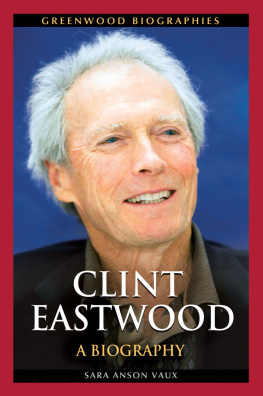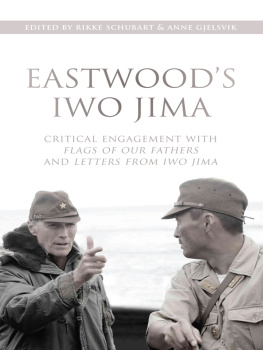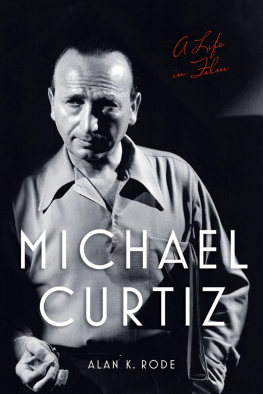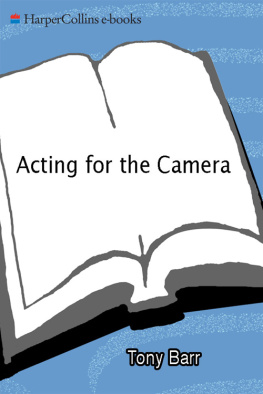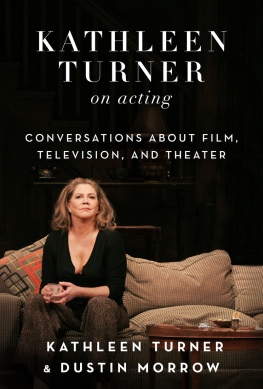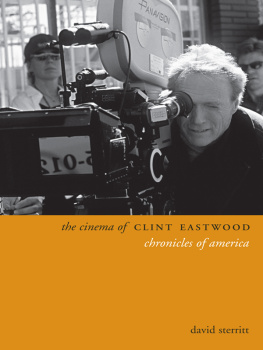CLINT EASTWOOD
Recent Titles in Greenwood Biographies
Ulysses S. Grant: A Biography
Robert B. Broadwater
Thurgood Marshall: A Biography
Glenn L. Starks and F. Erik Brooks
Katy Perry: A Biography
Kimberly Dillon Summers
Sonia Sotomayor: A Biography
Meg Greene
Stephen Colbert: A Biography
Catherine M. Andronik
William T. Sherman: A Biography
Robert P. Broadwater
Pope Benedict XVI: A Biography
Joann F. Price
Pel: A Biography
Lew H. Freedman
Malcolm X: A Biography
A.B. Assensoh and Yvette M. Alex-Assensoh
Elena Kagan: A Biography
Meg Greene
Bob Dylan: A Biography
Bob Batchelor
Jon Stewart: A Biography
Michael Blitz
Bill Gates: A Biography
Michael Becraft
Clint Eastwood
A Biography
Sara Anson Vaux
GREENWOOD BIOGRAPHIES
Copyright 2014 by ABC-CLIO, LLC
All rights reserved. No part of this publication may be reproduced, stored in a retrieval system, or transmitted, in any form or by any means, electronic, mechanical, photocopying, recording, or otherwise, except for the inclusion of brief quotations in a review, without prior permission in writing from the publisher.
Library of Congress Cataloging-in-Publication Data
Vaux, Sara Anson.
Clint Eastwood: a biography / Sara Anson Vaux.
pages cm (Greenwood biographies)
Includes bibliographical references and index.
ISBN 978-1-4408-2997-0 (hardback) ISBN 978-1-4408-2998-7 (ebook)
1. Eastwood, Clint, 1930- 2. Motion picture actors and actressesUnited StatesBiography. 3. Motion picture producers and directorsUnited StatesBiography. I. Title.
PN2287.E37V38 2014
791.4302'8092dc23
[B] 2014017772
ISBN: 978-1-4408-2997-0
EISBN: 978-1-4408-2998-7
18 17 16 15 14 1 2 3 4 5
This book is also available on the World Wide Web as an eBook.
Visit www.abc-clio.com for details.
Greenwood
An Imprint of ABC-CLIO, LLC
ABC-CLIO, LLC
130 Cremona Drive, P.O. Box 1911
Santa Barbara, California 93116-1911
This book is printed on acid-free paper 
Manufactured in the United States of America
Contents
In response to school and library needs, ABC-CLIO publishes this distinguished series of full-length biographies specifically for student use. Prepared by field experts and professionals, these engaging biographies are tailored for students who need challenging yet accessible biographies. Ideal for school assignments and student research, the length, format, and subject areas are designed to meet educators requirements and students interests.
ABC-CLIO offers an extensive selection of biographies spanning all curriculum-related subject areas including social studies, the sciences, literature and the arts, history and politics, and popular culture, covering public figures and famous personalities from all time periods and backgrounds, both historic and contemporary, who have made an impact on American and/or world culture. The subjects of these biographies were chosen based on comprehensive feedback from librarians and educators. Consideration was given to both curriculum relevance and inherent interest. Readers will find a wide array of subject choices from fascinating entertainers like Miley Cyrus and Lady Gaga to inspiring leaders like John F. Kennedy and Nelson Mandela, from the greatest athletes of our time like Michael Jordan and Muhammad Ali to the most amazing success stories of our day like J.K. Rowling and Oprah.
While the emphasis is on fact, not glorification, the books are meant to be fun to read. Each volume provides in-depth information about the subjects life from birth through childhood, the teen years, and adulthood. A thorough account relates family background and education, traces personal and professional influences, and explores struggles, accomplishments, and contributions. A timeline highlights the most significant life events against an historical perspective. Bibliographies supplement the reference value of each volume.
Until I saw Unforgiven when it first appeared in theaters, I only knew Clint Eastwood through snatches of movies I caught while my boys were watching them on TV. The first one I remember is Firefox. When I commented upon the dark screen and the strange persona of the protagonist played by Eastwood, I received a long lecture from my sons about the actors contributions to the mythology of the American (male) hero. With Unforgiven, I realized that as a director (and as an actor who plays it low), Eastwood was a sage cultural analyst who was not afraid to challenge myths of a pure West for just conquerors or to expose the devastations that ecological disasters and economic greed have visited upon men, women, and children.
Apart from Christopher Frayling, Laurence Knapp, and Kent Jones, American Eastwood analysts have focused largely upon his depiction of the American male, his private life, or the plot details of his many movies. French critics, writing from a broad film background that includes classical American cinema (including Westerns), approach his films from a philosophical and humanistic as well as a cinematic perspective. Michael Henry Wilsons astute interviews, Nol Simso los art-centered approach, and recently, essays in the French journal NUNC that look at Eastwood as deeply invested in the social, political, and ethical health of American society, grasp the foundational agenda of a sophisticated director. My book The Ethical Vision of Clint Eastwood (Eerdmans, 2012) offers an up-to-date analysis of Eastwoods most probing movies from an ethical and religious perspective little encountered by American audiences (although when I finished it, Hereafter was not available for study and J. Edgar had not yet reached theaters).
In the current Greenwood Biographies series, I have presented far more information on Eastwoods personal lifethe origins of his love for music, particularly jazz; his major television role in Rawhide; his breakthrough role as the Man with No Name in the Spaghetti Westerns; the establishment of his studio Malpaso, which allowed him creative freedom for his projects; the cultural shock of his role in Dirty Harry; his rise to superstardom; his romantic adventures; and, gradually, the shaping of a cinematic artist who is almost universally recognized as one of Americas finest directors.
My analysis of Eastwoods iconic movies (that is, those that mark his identity as a major director) arises at key moments as his life story unfolds. As Chicago filmmaker and critic Michael Smith writes on his blog whitecitycinema.com , I claim that Eastwoods body of work is highly unified even though he has never had a hand in writing scripts and is notorious for shooting his screenplays without rewrites.
The director himself has insisted since the first Dirty Harry (Don Siegel, 1971) appeared that he works with stories, not from a political agenda. Nonetheless, the spectator should regard authors protestations about their own work with a good deal of caution. Certain stories, certain ways of filming, elicit thoughtful responses. For instance, as I have studied four decades of Eastwood movies, I have observed that he consistently engages with the social fabric of American society: the (false) myths of cultural superiority that permeate a large portion of Hollywood movies; the marginalization of increasing numbers of nonwhite, non-rich persons; and the moral dilemmas in which everyday people find themselves. He could have made other choices for cinematography, music, and casting. He could have sanitized his Westerns, as literally thousands of movie and TV directors did before him. But he did not.

